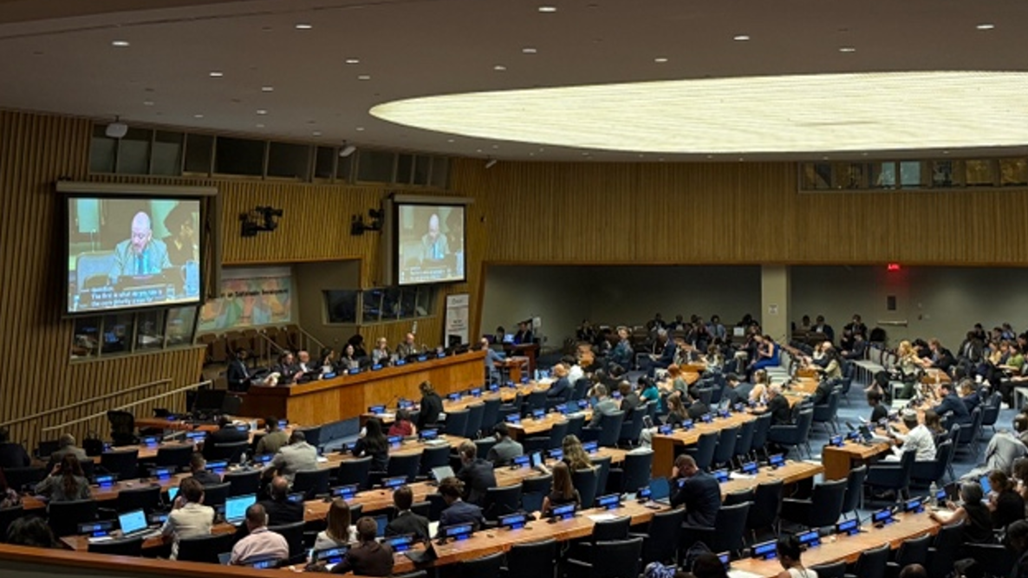CACCI participates in Sustainable, Economic, Social, and Environmental meetings at the UN
CACCI joined the High-level Political Forum on Sustainable Development (HLPF) Conference from July 14 to 24, 2025, under the auspices of the United Nations Economic and Social Council (ECOSOC). CACCI Sr. Officer Wenju Liao represented CACCI during the three-day Ministerial Segment held from July 21 to 23 under the theme, “UN@80: Catalyzing Change.”
As the UN’s central platform reviewing progress on the 2030 Agenda for Sustainable Development, brought together over 6,000 in-person participants, including governments, youth, civil society, the private sector, and other stakeholders―all focused on sharing experiences and scaling innovative, inclusive solutions to advance the Sustainable Development Goals (SDGs).
16 July 2025
(1) High-Level Political Forum on Sustainable Development
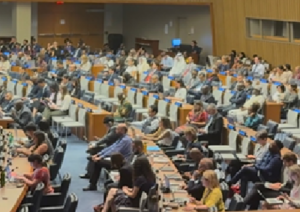
High-level Political Forum on Sustainable Development, held under the auspices of the UN Economic and Social Council, at United Nations Headquarters in New York. (Photo by CACCI Secretariat.)
Following a brief report from the UN Environment Programme on efforts to advance sustainable consumption and production, delegates reviewed SDG 8, which focuses on decent work and economic growth. In the afternoon, delegates discussed progress on the SDGs in Small Island Developing States (SIDS).
SDG 8 and Interlinkages with Other SDGs – Decent Work and Economic Growth
Discussants underscored SDG 8 as one of the most “off-track” goals, citing stagnation or regression in areas such as youth employment, informal work, labor rights, and child labor. The discussion explored proposals to reverse these trends by expanding employment opportunities while simultaneously strengthening labor rights, social protections, productivity, and inclusion.
Small Island Developing States: Strategies for SDG Success
The session emphasized early action on the Antigua and Barbuda Agenda for SIDS (ABAS), calling for strengthened data systems, tailored national policies, and expanded fiscal space. Delegates stressed the need to move beyond conventional metrics and highlighted the need for private sector engagement and long-term concessional financing.
17 July 2025
Discussions focused on a review of SDG 14 (Life Below Water), which remains the most underfunded SDG despite the ocean’s importance in human well-being. In the afternoon, a thematic session with Major Groups and Other Stakeholders (MGoS) explored how multilateralism can be renewed and strengthened to fulfill the promises of the 2030 Agenda. The day concluded with the segment on how local action can drive transformative change.
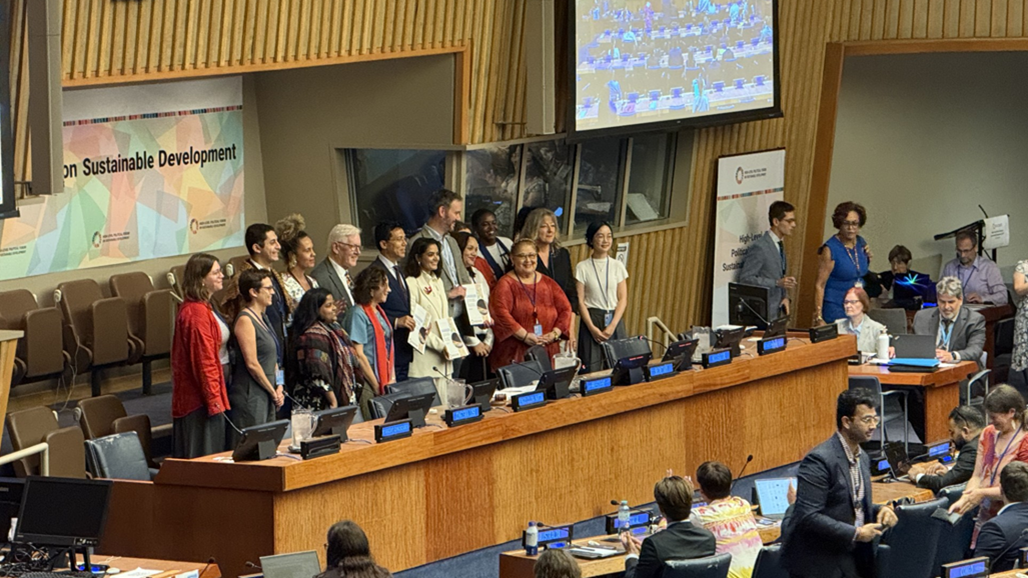
High-level Political Forum on Sustainable Development, held under the auspices of the UN Economic and Social Council, at United Nations Headquarters in New York. (Photo by CACCI Secretariat.)
SDG 14 and Interlinkages with Other SDGs – Life Below Water
The sesssion undescored ongoing data gaps, fragmented gouvernance, insufficient implementation of marine protected areas, and rising vulnerability in SIDS. Delegates called for integrating science, traditional knowledge, and human rights into ocean policies, expanding marine protections, combating illegal fishing, and supporting international agreements.
Delivering the 2030 Agenda: Aligning Global Processes Through Inclusive Multilateralism
Representatives from MGoS emphasized inclusive multilateralism as key to sustainable development. Panelists highlighted civil society’s vital role in advancing health, gender equality, workers’ rights, and youth engagement. Delegates called for stronger partnerships, increased civil society participation, and political will to back multistakeholder collaboration. Indigenous peoples and marginalized groups stressed rights and representation. The session concluded with a call for accountable multilateralism centered on “We the People.”
Transformation from the Ground Up: Acting at Local Level
Discussions focused on strengthening community engagement, gender-sensitive budgeting, participatory governance, and inclusive decision-making. Emphasis was placed on capacity building, improved local data, and fostering youth and volunteer involvement as essential drivers of sustainable transformation.
21 July 2025
(2) High-Level Segment of the Economic and Social Council – UN@80: Catalyzing Change
ECOSOC High-Level Segment: HLPF Ministerial Opening
ECOSOC President
Ambassador Bob Rae, President of ECOSOC and Chair of the HLPF, noted that this year’s forum is convening against a backdrop of “enormous global disruption.” He stressed that this is not the time to abandon ideals but to “double down” on solidarity.
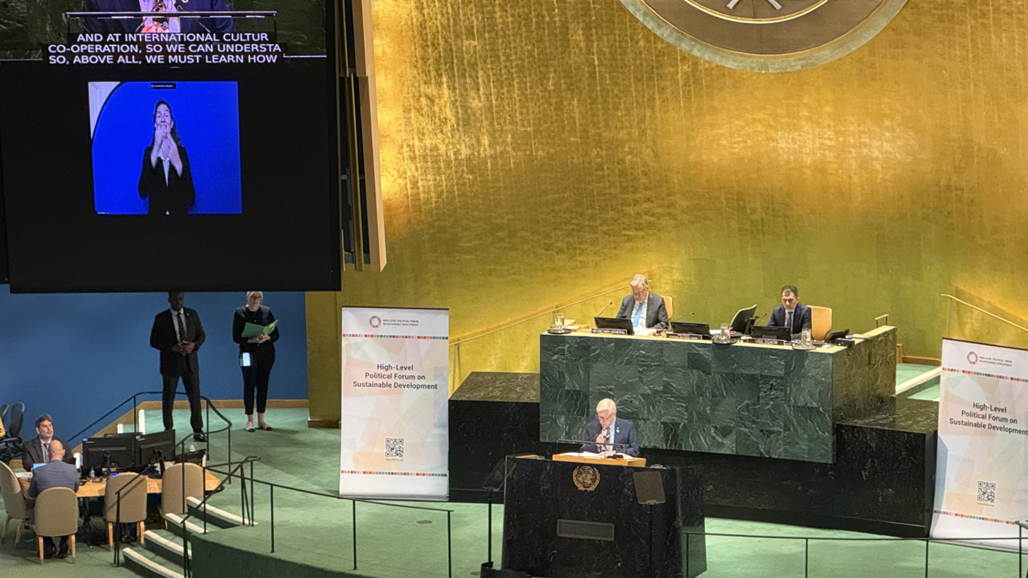
Bob Rae, President, ECOSOC.
UN Secretary-General
UN Secretary-General António Guterres welcomed progress at three recent global events—the World Health Assembly, the UN Ocean Conference, and Financing for Development Forum (FfD4)—saying the outcomes are not isolated wins but signs of momentum demonstrating that “multilateralism can deliver.”
UN General Assembly President
Philémon Yang, President, UN General Assembly, suggested the HLPF can serve as a platform for implementation policy guided by science and evidence, grounded in global solidarity and collaboration.
Major Group for Children and Youth's
Carolina Rojas of the Major Group for Children and Youth's stressed that sustainable development requires equitable distribution of resources and power. She called for, among other multilateral efforts, debt relief and long-term financial support for grassroots organizations, which are “the first to respond and last to get paid.”
22 July 2025
Following special panels on messages from the UN Environment Assembly (UNEA) and updates from the UN Regional Forums on sustainable development, delegates spent the remainder of the day hearing Voluntary National Review (VNR) presentations. The General Debate continued into the afternoon.
Messages from the UN Environment Assembly
Abdullah Bin Ali Al-Amri (Oman), President of the seventh session of the UN Environment Assembly (UNEA-7) emphasized the critical links between environmental action and sustainable development, highlighting the importance of a One Health approach, circular economy strategies, and gender-responsive solutions. He underscored the environmental toll of conflict and called for stronger political commitment to science-based, scalable policies ahead of UNEA-7.
Regional Perspectives on SDG implementation
The session highlighted regional approaches to SDG implementation, emphasizing the importance of aligning national and global frameworks, strengthening institutions, and advancing inclusive, data-driven policies. Key priorities included digital transformation, sustainable finance, and stronger multi-stakeholder partnerships. Regional leaders stressed the need for reforms in global financial systems, improved data for inclusion, and leveraging innovation to overcome structural challenges.
23 July 2025
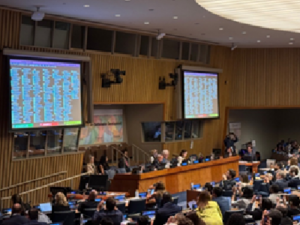
Delegates vote on a paragraph within the Ministerial Declaration. (Photo by CACCI Secretariat.)
Adoption of the Ministerial Declaration Conclusion of the HLPF
During the closing plenary, several delegations expressed opposition to specific sections of the Ministerial Declaration, prompting successive votes on paragraphs related to access to medicines (SDG 3), gender equality (SDG 5), and decent work for all (SDG 8). Some Member States dissociated themselves from specific paragraphs, while others voiced disappointment that the Declaration was not adopted by consensus.
(3) Voluntary National Reviews
A total of 35 countries presented their Voluntary National Reviews (VNRs) at the forum this year, offering a snapshot of national progress toward the SDGs. Member States shared successes and challenges, lessons learned, and proposed actions to accelerate implementation.
(4) General Debate
The Ministerial Segement featured statements from several high-level speakers, reaffirming their commitment to implementing the 2030 Agenda. However, many also acknowledged setbacks on speciific SDGs, and emphasized the need to reform the international financing architecture to better support SDG progress. A recurring theme throughout the debate was the importance of multilaterism.
24 July 2025
(5) ECOSOC High-level Segment
The ECOSOC High-Level Segment concluded with sessions on evidence-based strategies to accelerate progress on SDGs and on global cooperation amid rising geopolitical fragmentation. Marking the UN’s 80th anniversary, discussions also addressed the evolving role of ECOSOC and how it can strengthen its leadership and functions to enhance its effectiveness and dynamism in advancing multilateral solutions.
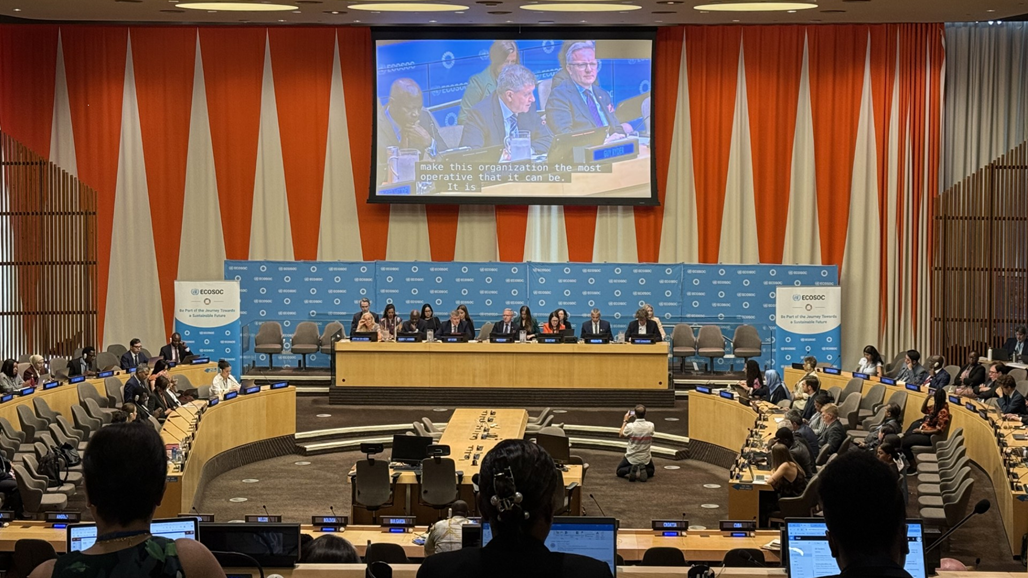
ECOSOC High-level Segment in the ECOSOC Chamber. (Photo by CACCI Secretariat.)



